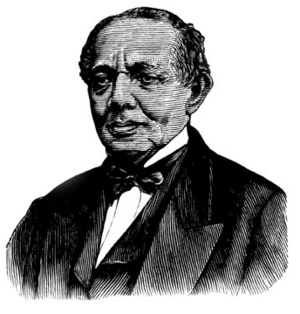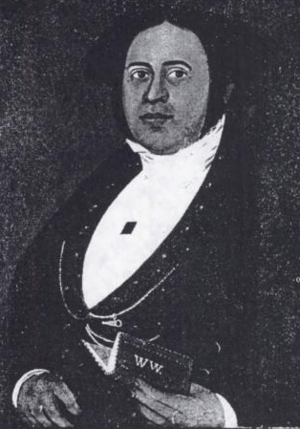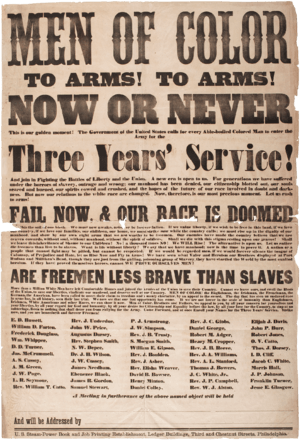William Whipper facts for kids
Quick facts for kids
William Whipper
|
|
|---|---|
 |
|
| Born | February 22, 1804 Drumore Township, Lancaster County, Pennsylvania
|
| Died | March 9, 1876 (aged 72) |
William Whipper (born February 22, 1804 – died March 9, 1876) was an important African American businessman and a leader in the abolitionist movement in the United States. Abolitionists were people who worked to end slavery.
Whipper believed in using peaceful methods to bring about change. He helped start the American Moral Reform Society, one of the first groups of African Americans working to end slavery. He also helped create the Reading Room Society, a group focused on helping Black people in Philadelphia improve their minds. William Whipper showed how successful Black people in the Northern states could become in the mid-1800s.
Contents
Early Life and Beliefs
William Whipper was born on February 22, 1804, in Drumore Township, Lancaster County, Pennsylvania. His mother was an enslaved African American, and his father was her white owner. William had several brothers and sisters.
In the 1820s, he moved to Philadelphia and started his own businesses. In 1834, he opened a grocery store that sold "free labor" goods. This meant the products were made without the use of enslaved people. He also supported the temperance movement, which encouraged people to avoid alcohol. Whipper believed that alcohol caused problems in Africa and contributed to the slave trade.
His support for the temperance movement led him to become very active in the fight against slavery.
Business Success and the Underground Railroad
In 1835, Whipper moved to Columbia, Pennsylvania. There, he partnered with another Black businessman, Stephen Smith. Together, they built one of the most successful lumberyards in the state. Their success showed how much Black people could achieve in the free Northern states.
Whipper used his wealth to support his fight for moral improvement and to end slavery. He helped many enslaved people escape to freedom in the North through the Underground Railroad. The Underground Railroad was a secret network of safe houses and routes used by enslaved African Americans to escape to free states and Canada. He even used his own railroad cars to help transport people.
Whipper was also involved with the Philomathean Institute in Philadelphia. This was a literary group that included famous figures like Frederick Douglass. His sister, Mary Ann, lived in Dresden, Ontario, Canada, which was a final stop on the Underground Railroad. She and her husband managed William Whipper's investments there.
Ideas for Change: Nonviolence and Moral Reform
William Whipper had strong and thoughtful ideas about how to end slavery. One of his main beliefs was in "moral reform." This idea suggested that improving the behavior and character of Black people would help the abolitionist movement.
Whipper first thought that white prejudice against Black Americans came from the difficult situations Black people were in, not just their skin color. He believed that if Black people improved their education, their financial situations, and their moral character, they would be more accepted by white society.
Another key part of Whipper's ideas was the importance of nonviolence and using calm, reasonable arguments. When he was 24, Whipper wrote a famous essay called "An Address on Non-Resistance to Offensive Aggression." In this essay, he argued that peaceful methods were the best way to bring about political change. His ideas were similar to the nonviolent strategies used in later civil rights movements.
Whipper showed his dedication to moral reform by helping to create the American Moral Reform Society. In 1835, he attended a meeting in Philadelphia called the Convention for the Improvement of Free People of Color. He pushed for the group to stop using the word "colored." Because of his efforts, the delegates decided to form a new society that would not have any racial limits. This led to the creation of the American Moral Reform Society, and Whipper is known as one of its founders. The society aimed to educate Black people, start Black newspapers, and publish histories of Black people.
Whipper, along with Alfred Niger and Augustus Price, wrote a speech to explain the purpose of the American Moral Reform Society to the public. They stated that "poor morals" caused racial prejudice. They believed that moral reform was the best way to improve the lives of Black Americans. The speech also called for the society to ignore "national differences, skin color variations, and geographical lines."
In the late 1850s and early 1860s, Whipper worked with George DeBaptiste to buy a steamboat called the T. Whitney. This boat carried lumber and also helped enslaved people escape between Sandusky, Ohio, Detroit, Michigan, and Amherstburg, Ontario.
Family Life
William Whipper married Harriet Smith (1818–1906), who was the sister of his business partner, Stephen Smith. They had a daughter named Harriet in 1837, but she seems to have died young.
Whipper raised his nephew, James Whipper Purnell, as his own son. He taught James about the lumber business and how the Underground Railroad worked. James Purnell later became a lumber merchant in Chatham, Ontario. He also served as secretary to Martin R. Delany when Delany was planning an expedition to Africa.
James Whipper Purnell married Julia Ann Shadd in 1864. She was a cousin of Mary Ann Shadd Cary, a well-known educator and activist. Their son, Dr. William Whipper Purnell, became a doctor in Washington, D.C., and later in Oakland, California. Dr. Purnell served in the United States Army during the Spanish–American War.
Dr. William Whipper Purnell married Theodora Lee of Chicago, Illinois. Her grandfather, John Jones, was a tailor, businessman, and a famous abolitionist before the Civil War. They had one son, Lee Julian Purnell (1896–1983). He was one of the first African Americans to graduate from the Massachusetts Institute of Technology with a degree in electrical engineering. He had a successful engineering business and was the dean of the engineering department at Howard University for 20 years. His son, Lee Julian Purnell, Jr., was an electrician and building contractor.
African-American educator and author Frances Rollin Whipper was married to Whipper's nephew, attorney William James Whipper. Their son was the actor Leigh Whipper.
 | DeHart Hubbard |
 | Wilma Rudolph |
 | Jesse Owens |
 | Jackie Joyner-Kersee |
 | Major Taylor |



